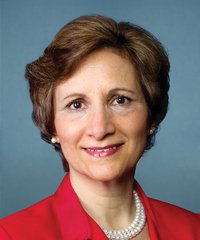
Congresswoman Suzanne Bonamici represents the First Congressional District of Oregon, which includes Washington, Yamhill, Clatsop, and Columbia counties and part of Multnomah County.
Strengthening public education is one of Suzanne's top priorities and one of the reasons she got involved in public service. Suzanne spent hundreds of hours volunteering in public schools before serving in the Oregon State Legislature, where she passed legislation to reduce duplicative testing. In Congress, she is a leader on the Education and Labor Committee and Chair of the Subcommittee on Civil Rights and Human Services.
Making long-term investments in transportation and infrastructure stimulates the economy, creates jobs, and drives commerce. It is also an opportunity to rebuild systems in a sustainable and resilient manner, reduce carbon emissions, improve energy efficiency, and support vulnerable communities. New infrastructure programs should invest in projects that reduce pollution and use natural infrastructure solutions.
The needs of surface transportation infrastructure are widely and rightfully recognized. But in the Northwest, we know that a comprehensive infrastructure package needs to go beyond roads and bridges. Investing in infrastructure must also include accessible public transit, building affordable housing, upgrading water systems, repairing ports, modernizing public schools, and strengthening decarbonized transportation systems in a resilient and sustainable manner. I’m focused on the federal responsibility to improve infrastructure and upgrade our multi-modal transportation system. Smart transportation projects, like the Newberg-Dundee Bypass and the Southwest Corridor Light Rail, will help more people get to work, school, and other destinations in the community more quickly and reliably while also reducing emissions by decreasing the number of vehicles on our roads. These projects also recognize the need to enhance our resiliency in advance of a Cascadia Subduction Zone event in the Northwest.
Finally, federal investment in infrastructure will create needed construction jobs in our communities. I’ll pursue every opportunity to make sure that all workers—especially women and people of color who traditionally haven’t worked in construction—have access to the training and supports needed to qualify for these jobs, and will work to make sure that minority and women owned small businesses can compete for these federal contracts.